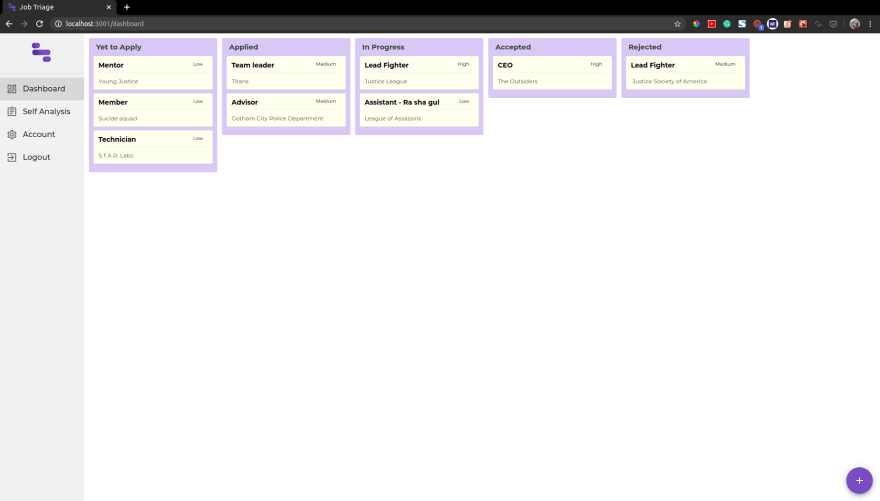Searching for a job is exhausting. We may have to constantly prepare for interviews, apply for companies, have multiple interview calls, and of course constantly facing rejections. The best way to reduce this pain is by organizing your job search. Not only it will make job search easy but
organizing things will have a soothing effect.
Remember the time when you organize your laptop by deleting unnecessary files and arranging your folders etc. How does it feel? Exactly! That's what I am talking about. Organizing things has always been a meditation for humans and I thought we can apply the same to job search
TLDR: Check out JobTriage - an interactive way to manage your job applications
Job Triage
JobTriage is the new open-source project for managing your job search. It is indeed an interactive way to manage and track your job applications with a kanban board. In this post, I will discuss the features and some important components of the job search.
JobTriage lets you add job applications along with priority(high, medium, low). You can add notes, time log for each application, and prepare your interviews according to its priority.
Self-analysis
Self-analysis is very important and basic yet we fail to give importance. It should be given the same weightage to that of technical interviews. I will discuss some basic components of self-analysis.
1. Personal pitch
"Tell me about yourself" - The most daunting question asked in an interview. You are with you for the entire life and suddenly you know nothing about yourself. Lack of practice is the main reason for this problem.
Personal pitch is something you say to sell yourself under 60 seconds. An ideal personal / Elevator pitch should be in 60 seconds, with most of the part covering your academic and work experiences and highlights in your career.
- It should be small and precise
- Practice it regularly
- Modify your pitch a little based on the interview
2. Behavior analysis
STAR stories: It is a method to construct your answers in an organized way. The answers should follow this pattern:
- Situation
- Task
- Action
- Results
Some example questions are
- Tell me your hardest challenge
- What was the most stressful situation you have faced?
- When is the last time you had to introduce a new idea or procedure to people on this job? How did you do it?
- Tell us about the setbacks you have faced. How did you deal with them?
Traditional and cultural fit questions: These are very common questions asked in an interview.
- What are your strengths and weakness?
- How do you keep up with current trends and advances in the field?
- What is your ideal job?
- What is your ideal company?
How job triage can help ? Well, it can't prepare a pitch for you but you can add your pitch and stories in the platform, improve and practice it constantly. We are going old school here. If you write it, you remember it better.
Blogs
The blogs section will be available on our site. It will comprise of blogs which will help to accelerate our career. Everyone can contribute to this. This is a community process and we should help one another to become better. If you want your thoughts to be posted on our site, please make a PR in this repository. Don't worry we will give proper credits and link your site/social account.
This does not mean that you can only add your thoughts. If you come across some good content share it with us. We will try to get permission from the author and add it to our site.
Future
It is definitely not going to stop here, this just a first version and there will be more features like chrome extension, weekly emails about your interview events, Google calendar integration, etc.
Tech stack
- Backend: Ruby on rails
- Frontend: React
- Database: Mongo
Important links
Github Repo: https://github.com/jobtriage/jobtriage
Home page: https://jobtriage.org/
App: https://app.jobtriage.org/
As I said before this is a community process. Use the application, create issues, and feature requests to our repo. If you have time, come contribute with us 💜
Happy Triaging :)





Top comments (0)